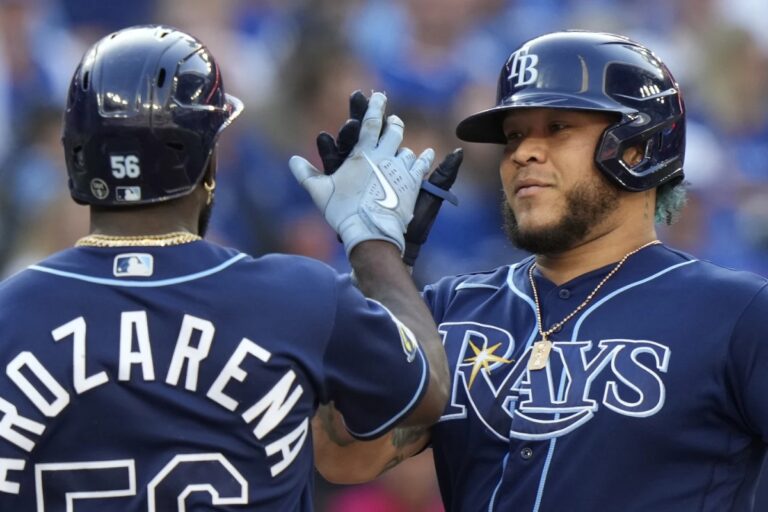
PHOENIX (AP) — Bryce Harper believes that letting big leaguers play in the 2028 Los Angeles Olympics would be cool.
And you know what? He’s absolutely right.
“I mean, I think it would be really cool. I think it would be a lot of fun,” Harper said. “I don’t know if they’ll ever go for it, but I would love to put USA on my chest and represent it at the highest level.”
The problem — and really that should be problem(s) — is it would require some major logistical gymnastics for Major League Baseball and it’s unclear if the sport is willing to have a weeks-long disruption in the middle of its regular season to make it happen. MLB didn’t let players on active big league rosters participate in 2000, 2004 and 2008, one of many reasons the sport was cut for 2012 and 2016.
It’s been a yo-yo ride for baseball ever since: It was part of the delayed 2020 Olympics in Tokyo — Japan’s Nippon Professional Baseball even interrupted its season so its top players could participate. It won’t be in Paris next summer.
But earlier this week, baseball found out it was back in the Olympics fold. Five sports were added to the 2028 Los Angeles Games by the International Olympic Committee with cricket, flag football, baseball-softball, lacrosse and squash making the cut.
The slate of sports cleared a final hurdle from the Olympic body’s full membership at a meeting in Mumbai, India, after being proposed by Los Angeles officials one week ago and recommended by the IOC executive board last week.
Harper was pumped.
“I will be old at that point, so I don’t know if they’re going to want me to be on the team, but it’s always a dream,” Harper said. “I mean, I think it’s everybody’s dream to be in the Olympics.”
International competition has always been a siren song for baseball, which is one of the reasons the World Baseball Classic was created in 2006. It hasn’t always gone exactly according to plan, but the WBC has had its genuinely awesome moments. The most recent version featured a memorable U.S.-Mexico game that drew more than 47,000 fans at Chase Field in Phoenix.
There was also a dream matchup in this year’s final: Japan’s Shohei Ohtani faced United States star Mike Trout in the ninth inning with two outs in a one-run game. Ohtani got the best of his Angels teammate, striking out Trout to secure a 3-2 win for Japan.
Arizona Diamondbacks pitcher Merrill Kelly, who started the final for the U.S., had rave reviews about the tournament. In fact, it’s hard to find an MLB player who didn’t enjoy the experience.
“It was incredible,” Kelly said. “From start to finish, just being in that environment, being around the guys I was around … it was definitely special.”
Even so, it’s unclear how much the WBC is boosting the sport’s popularity around the world.
One of the reasons baseball has always been a tough sell for the Olympics is its still a fairly regional game. It’s big in the U.S. and other places like the Dominican Republic, Mexico, Cuba and Venezuela. It’s also got a solid foothold in Japan and South Korea.
But it’s not particularly popular in large swaths of the world, including Europe, Africa and most of South America. Even in the WBC, the tournament struggles to field more than 10 or 12 competitive teams.
Then there’s MLB’s 162-game regular season schedule, which doesn’t allow for a ton of interruptions. The Los Angeles games in 2028 are scheduled to take place the final two weeks in July, which would cut a huge swath into MLB’s summer-long experience. That’s usually prime money-making time for teams, which draw large crowds since families are on vacation and schools are on summer break.
MLB’s postseason schedule already extends to the early days of November. If a Game 7 is played in this year’s Fall Classic, it’s scheduled for Nov. 4. A two-week Olympics break could potentially push the World Series closer to Thanksgiving. MLB could also start its season earlier, like in mid-March, but that would also include some frigid games in certain parts of the country.
The All-Star Game could also be canceled, giving MLB four more days to work with on the schedule — but taking another marquee baseball event off the calendar.
There’s also other questions: What would the 95% of MLB players not participating in the Olympics do with their extra weeks of free time? How would MLB teams feel — or be compensated through insurance policies — if important players ( hello Edwin Diaz ) get injured?
And, of course, the WBC is backed by MLB, with proceeds kicked back to the league and its owners. Would MLB want to let its own tournament be undermined as the pinnacle of international baseball competition, particularly without compensation?
There’s precedent, at least. The NHL used to pause its regular season while its stars competed in the Winter Games. But that experiment didn’t last two full decades — the NHL hasn’t let its pros go to the Olympics since 2014 in Sochi.
Even with all those problems, MLB players in the Olympics remains a fascinating possibility, especially on U.S. turf in Los Angeles.
“I know the WBC and everybody loves that, and it’s great for the game, but it’s not the Olympics,” Harper said.
___
AP Sports Writer Graham Dunbar contributed to this story.
___
AP MLB: https://apnews.com/hub/MLB